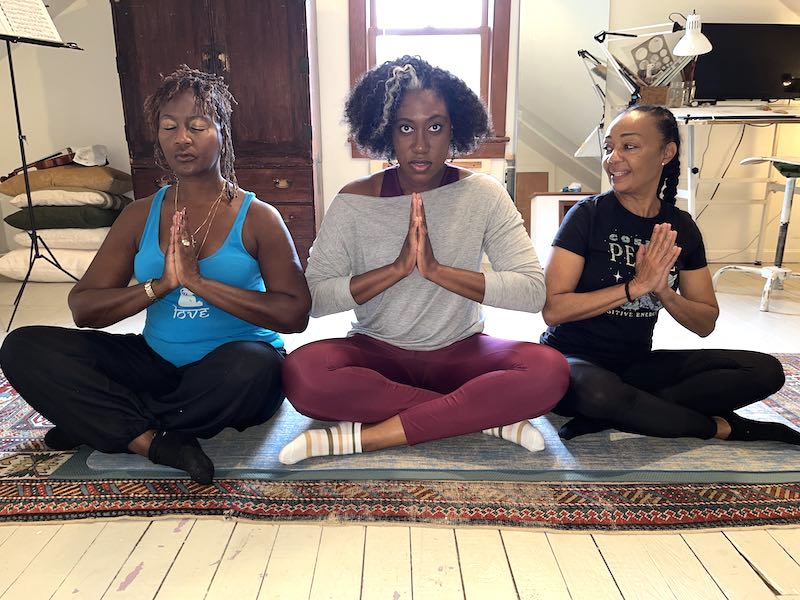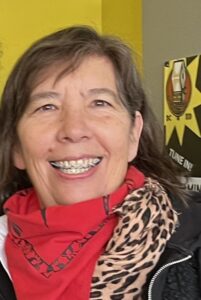Imagine three wind or string instrumentalists playing a chamber music score in which resonant themes and variations are played solo as if in conversation. The music is neither harmony nor atonality; it’s more experimental and less formalistic than that — because each instrumentalist is improvising independently. Though they seem to be playing to be heard and responded to by the other two, there soon dawns a sense that each may actually be playing to hear how the notes sound inside the quiet of their own mind.
A composer has evidently set forth a score that cues each improvisation, often sampling passages from preexisting sources note for note. But the meaning is not so much in the music as in being privy to three soloists’ insistent interiority and absorbing absorption in themselves.
Such was the cerebral experience that pulled this outside listener in as I attended an invited preview of Awakening Club, a new three-hander written and directed by Sean Surla, a local playwright whose work has warranted DCTA’s serious attention in the past.

The setup is simple: Three unnamed women have gathered somewhere unspecified “to explore self-awareness, mindfulness, and lovingkindness practices,” together in mutual support. The generic space is set with three wooden chairs, a table, two stools, and a carpet, all lit by a warm wash. The women are dressed casually in slacks, boots, and sweaters. This is their third such talking-circle meeting, and the play starts without preliminaries as if picking up where the last one left off: Woman #1 (Nefertari Rasaq) begins by reading Woman #2 (Barbara Cooper) an extended passage about repetition by the lesbian artist Gertrude Stein. “It’s avant-garde writing that I’ve always felt or thought of as presencing writing,” explains #1, herself a lesbian artist. “All about putting one in the present moment.”
Such “presencing” emerges as a key component of the “awakening,” “self-loving voice,” and judgment-free “god place in us” that the women seek. Throughout their self-reflective session there will be other sage sources cited — Indian guru Maharaji, Persian poet Rumi, German-born spiritual teacher Elkhart Tolle, singer-songwriter Joni Mitchell. But the women generate and share so many of their own thought-provoking meditative mantras and self-affirming maxims that one might wish to retain a few gems for oneself with a metaphoric bookmark or yellow highlighter in the air.
There is a thin thread of a story that turns on Woman #1’s efforts to heal from hurtful breakups with lovers. Rasaq makes #1’s emotional arc compelling, especially when she is being comforted by Woman #3 (Patricia Williams Dugueye) — who is straight and happily married with kids. “I’m sick of being alone,” #1 bewails. “I’m sick of being stuck here. I’m fucking lonely. There I’ve said it.” We glean few other biographical details. About #2 we learn only that she has to exit abruptly to take a work call — which leaves #1 and #3 alone on stage where they become deepeningly emotionally bonded.

The Awakening Club, Sean Surla told me, is “autobiographical” and a play in her “existential angst” series, which tracks with the text. One can readily sense that the playwright has invested Woman #1 with the clearest personal motivation for awakening and the most credible emotional arc.
The women seal their alignment and commitment to mutual self-affirmation with a playful signal that entails a pinky link, a hand on heart, high fives, and pointing at one another. And near the end, they do an enjoyable dance while singing Mitchell’s “The Circle Game” (“We’re captive on the carousel of time…we go round and round and round…), nicely harking back to Stein’s trademark repetition. It would have served as a fine finish. The subsequent scene where they draw their “spirit animal” from a deck of cards seemed an anticlimactic digression.
There isn’t much else that actually happens. For the most part, The Awakening Club plays as if its three nameless characters are journaling impromptu out loud. Seeking mindfulness and enlightenment doesn’t really read as dramatic action. And the play could benefit from trimming.
But watching Awakening Club, I had my own awakening (as I suspect others will as well; there’s a tsunami of truths there). In my case, curiously, I was reminded of Samuel Beckett’s near-plotless static storytelling — his extended experiment in dramatic composition that essentially valorized the solitary existential inertia of desiccated old men. By contrast, Sean Surla’s giving voice to a vibrant sisterhood of soulful seekers after self-love seemed a whole lot more life-loving.
Running Time: 90 minutes, no intermission.
Awakening Club plays January 6, 7, and 13, 2023, at 8 pm presented by Sean Surla performing at DC Arts Center, 2438 18th Street NW, Washington, DC. Purchase tickets ($25 or pay what you will) online. (DCAC members call 202-462-7833 or 202-841-4434 for $20 tickets.)
Awakening Club
Written & Directed by Sean Surla
Actor #1 Nefertari Rasaq
Actor #2 Barbara Cooper
Actor #3 Patricia Williams Dugueye




